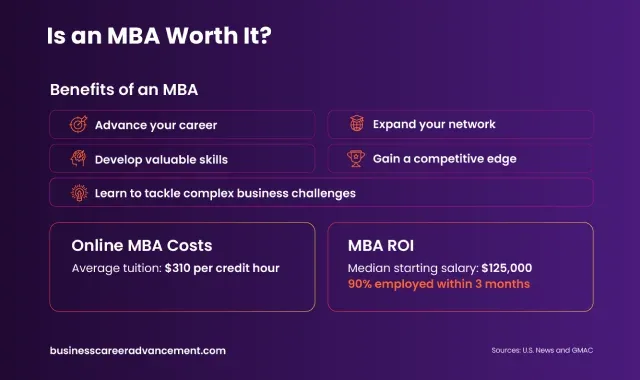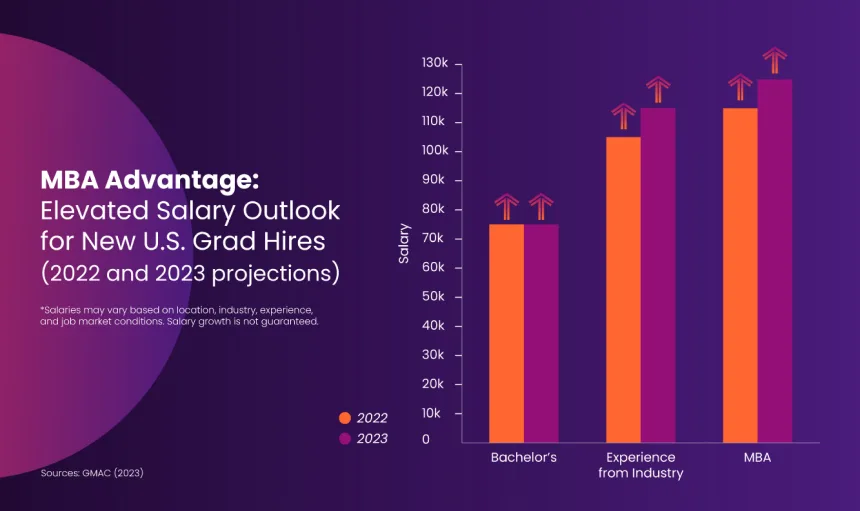Is Earning an MBA Worth It?
Learn about the value of an advanced degree to make an informed decision about pursuing an online MBA

Deciding to pursue an MBA: What you need to know
A Master of Business Administration is often seen as something that can open doors to career advancement and higher salaries. However, with the rise of online education, you might be wondering if an online MBA is worth the investment. Here, we will explore the benefits and costs of earning an online MBA, the potential return on investment, and how to make sure the program aligns with your personal and professional goals.

The benefits of earning an MBA
One of the main benefits of earning an MBA is the potential for career advancement and increased job opportunities. Employers value the skills and knowledge gained through an MBA program, and it can help individuals stand out in the job market. Some of the top benefits of earning your MBA
- Can provide access to higher-level positions and leadership roles
- Gain networking opportunities and alumni connections for career mentorship guidance
- Develop valuable business skills around topics like finance, marketing, and operations
- Build critical thinking skills and learn effective communication skills

MBA concentrations, tracks, and specializations
One advantage of pursuing an MBA is the ability to specialize your skills with different tracks or concentrations. Some popular MBA specializations include:
- Accounting
- Human resources
- Cyber security
- Marketing
- Healthcare
- Information Technology
These concentrations can help individuals develop specific skills and knowledge that are relevant to their desired career path.

Costs of pursuing an online MBA
The most significant cost of earning your MBA is tuition, which can vary widely depending on the program and institution. According to data from U.S. News & World Report, the average cost among the 10 most affordable online MBA options for out-of-state students is $310 per credit hour.
Private schools can cost up to two or three times more. The extra tuition often comes with benefits like higher-quality education, name recognition, and established faculty.
As you research schools, you can also inquire about grants, scholarships, and financing/student loans that can help ease the cost burden.

Return on investment (ROI) of an MBA
The potential ROI of an MBA is a significant factor to consider when deciding whether to pursue this degree. While the cost of an MBA can be high, the potential salary increase and long-term earning potential for MBA graduates can make it a worthwhile investment. MBAs help build universal skills that apply across fields and industries, but most also offer the opportunity to tailor your educational experience to your specific goals, field, and interests.
In 2023, a GMAC corporate recruiters survey found the median starting salary in the U.S. for recent MBA graduates stands at an impressive $125,000. The U.S. Bureau of Labor and Statistics quotes the average earnings for a bachelor's degree graduate at $77,000, so you can see the added benefit of earning a post-graduate degree. Additionally, MBA holders often have access to higher-level positions and greater opportunities for career advancement.
Another way to see it as providing a return on your investment is to learn about your marketability once you've obtained a degree. According to a survey by the Graduate Management Admission Council (GMAC), over 90% of MBA graduates globally secure employment within three months of graduation.
Lastly, there is no price tag that can be placed on the feeling of personal accomplishment that comes with knowing that you tackled a goal to better yourself and maximize your potential through earning your MBA
Additional factors to consider when deciding
While earning an MBA has many potential benefits, you should consider whether this degree is worth the investment. Factors to consider:
- Personal and professional goals: Will an MBA help you achieve your desired career path?
- Financial situation: Can you afford tuition and expenses? What financial aid, scholarship, and grant options are available to you?
- Program reputation: Are the program and the university accredited by respected regional and industry organizations?
- Alternatives: Are there other options, such as specialized master's degrees or professional certifications, that may be a better fit?

Making the right MBA choice for you
Ultimately, the decision to pursue an MBA is personal and should be based on careful research and self-reflection. It's important to seek advice from mentors, alumni, and industry professionals to understand the potential benefits of an MBA.
Are you considering an online MBA program? Our enrollment advisors can help you find an MBA that fits your goals and circumstances.